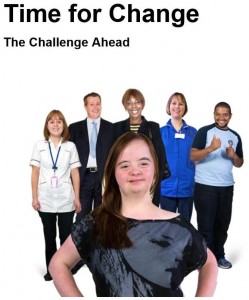Sir Stephen Bubb, tasked with leading the work into establishing stronger safeguards and support for adults with learning difficulties after the scandal of abuse at Winterbourne View, has published his latest and final report: Time for change: the challenge ahead.
 In the report, commissioned by NHS England (NHSE), Sir Stephen acknowledges the progress made in the last year by the transforming care programme, but speaks of significant challenges ahead and expresses views on how best to meet them.
In the report, commissioned by NHS England (NHSE), Sir Stephen acknowledges the progress made in the last year by the transforming care programme, but speaks of significant challenges ahead and expresses views on how best to meet them.
NHSE recently announced a major programme to move people with learning disabilities out of hospital and into their communities, a move which Sir Stephen has welcomed. It is believed this programme, combined with an increase in specialist staff, including nurses, will help transform care for thousands of adults living in care. The Department of Health will continue to work with NHSE, local government and other health and care partners to make sure the plan is delivered.
The Transforming Care programme is led jointly by NHSE, the Association of Adult Social Services (ADASS), the Care Quality Commission (CQC), Local Government Association (LGA), Health Education England (HEE) and the Department of Health (DH).
Meanwhile, HEE has recently set out plans which will result in an increase of around 5,700 specialist learning disability nurses being available to both NHS providers and the non-NHS provider sector by 2020.
Read the full report here. An easy read version is available here.
4 comments
Comment by Pearl Baker posted on
There appears to be a growing number of individuals suffering from a Learning Disability, and Mental Illness leaving Residential Care and placing them into 'Supported unregulated accommodation', without 'specialist' support? I was informed by environmental health they had concerns with those suffering from a Learning Disability were being placed into multi occupancy accommodation, and these premises (properties) did not come under regulation, at the time of speaking to me, they were trying to establish where they were, and visiting to view the safety of the buildings.
Is there insufficient attention to this ever increasing group of Learning Disability individuals being placed into 'Supported unregulated accommodation'? my concern is this could be the next 'scandal' to 'hit the headlines', it is already being 'highlighted by me for those suffering from Mental Illness.
Comment by Kim mclaughlin posted on
I dont understand why after all these years the they have had the saftey of our help and guidence , but now they have to go out into the community and leave a home ,that they have lived in for years, the people that are making these changes clearly do not understand what they are doing to the young and old with a learng Disability and Autisum because they do not like change . They clearly need to look at other ways of saving money instead of hitting out at the vulnerable .
Comment by Alison Giraud-Saunders posted on
I am puzzled about the reference above to HEE plans for 5,700 extra learning disability nurses. The document that comes up when I click on the link includes this sentence: "The East Midlands training levels will provide for over 5,700 growth in nurses, midwives, AHPs and scientists over the next five years", but the national figure for training places for learning disability nurses in 2016/17 is given as 638 - a decrease of 3.9%. I cannot see how this level would yield 5,700 extra by 2020.
Comment by Russ Fearon posted on
I feel that unfortunately due to the government cut backs in funding to councils has resulted in the decision which can receive cut backs with out up-roar is to those Adults with Learning Difficulties.
Result a cut back in the funding to both the day and residential services for 'Adults with Learniing Difficulties' and the combination of services with those seeking to provide a similar service for those with 'mental health issues' whether long.or short term.
Social Service.counsells are placing its eggs in one basket for without familiarty the general public have diifficulty in separating those
with 'learning difficulties' from those with 'mental health issues'. It has become a grey area, proving to be a relatively easy area to combine services and therefore cut costs.
Only by publicity ofr this can pressure to be applied for these cut backs to be prevented or at least restricted.
Community Pathways.